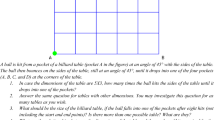Abstract
This study examined the effects of cooperative homework on mathematics achievement, taking into account team characteristics. Results of analysis of covariance (ANCOVA) showed that three-member teams high in ability (three high achievers or two high achievers plus one middle/low achiever) seem preferable in organizing cooperative learning for mathematics homework. Middle and low achievers all benefited from cooperative mathematics homework, whereas high achievers did not although they still maintained their top position in mathematics achievement.
Similar content being viewed by others
References
ChambersB. and AbramiP. C.: 1991, ‘The relationship between student team learning outcomes and achievement, causal attributions, and affect’, Journal of Educational Psychology 83, 140–146.
CohenJ. and CohenP.: 1983, Applied Multiple Regression/Correlation Analysis in Behavioral Sciences. Lawrence Erlbaum Associates, Hillsdale, NJ.
DavidsonN. and KrollD. L.: 1991, ‘An overview of research on cooperative learning related to mathematics’, Journal for Research in Mathematics Education 22, 362–365.
JohnsonD. W., MaruyamaG., JohnsonR. T., NelsonD. and SkonL.: 1981, ‘Effects of cooperative, competitive, and individualistic goal structures on achievement: A meta-analysis’, Psychological Bulletin 89, 47–62.
PedhazurE. J.: 1982, Multiple Regression in Behavioral Research: Explanation and Prediction. Holt, Rinehart and Winston, New York.
SharanS.: 1980, ‘Cooperative learning in small groups: Recent methods and effects on achievement, attitudes, and ethnic relations’, Review of Educational Research 10, 241–271.
SharanS. (Ed.): 1990, Cooperative Learning: Theory and Research. Praeger, New York.
SlavinR. E.: 1980, ‘Cooperative learning’, Review of Educational Research 50, 315–342.
SlavinR. E.: 1983a, Cooperative Learning, Longman, New York.
SlavinR. E.: 1983b, ‘When does cooperative learning increase student achievement?’ Psychological Bulletin 94, 429–445.
SlavinR. E.: 1985, ‘An introduction to cooperative learning research’. In R.Slavin, S.Sharan, S.Kagan, R.Hertz-Lazarowitz, C.Webb and R.Schmuch (Eds.), Learning to cooperate, cooperate to learn (pp. 5–15). Plenum, New York.
StevensR. J., SlavinR. E. and FarnishA. M.: 1991, ‘The effects of cooperative learning and direct instruction in reading comprehension strategies on main idea identification’. Journal of Educational Psychology 83, 8–16.
Author information
Authors and Affiliations
Rights and permissions
About this article
Cite this article
Ma, X. The effects of cooperative homework on mathematics achievement of Chinese high school students. Educational Studies in Mathematics 31, 379–387 (1996). https://doi.org/10.1007/BF00369155
Issue Date:
DOI: https://doi.org/10.1007/BF00369155




